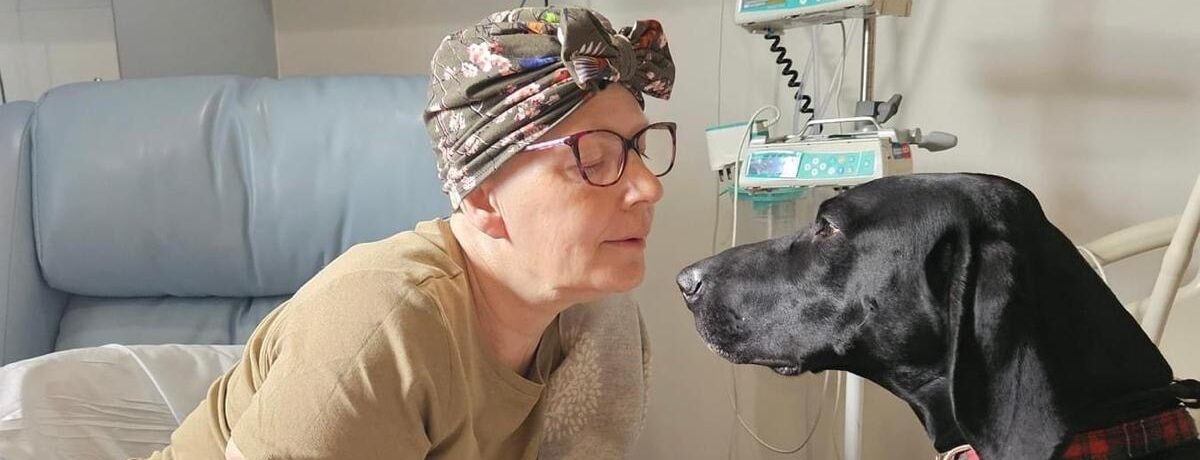
24 Sep 2025
German Pointer dog, Clyde was really important in Amanda’s recovery.
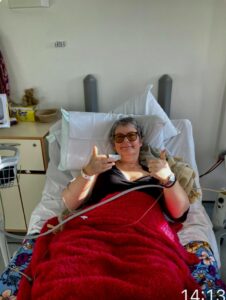
Amanda during treatment
Amanda Brown’s work as a Community Rehabilitation Senior in the NHS means she has helped countless people regain mobility after major illnesses and injuries. Her job already required compassion. But when she faced her own recovery after gruelling leukaemia treatment, she gained new understanding and respect for her patients and is now looking forward to returning to work so she can use her experience to help others.
“The first symptoms I had were extreme tiredness and itchy rashes,” said Amanda, 58, who lives in the Forest of Dean in Gloucestershire. “I eventually went to the doctor in October 2023 and was given anti-depressants and told I had shingles. I came home in floods of tears and threw the anti-depressants in the back of the cupboard and never took them. I said to my husband David ‘I’m not depressed, I’m exhausted’. My job in the NHS was full time and pressured and it was a struggle to keep going. One day I was driving on the motorway and thought ‘I could just shut my eyes now and go to sleep’. That’s the point I went back to the GP and asked for a ‘well woman’ check-up which I knew included blood tests. By this time it was April 2024 and, incredibly, they booked me in the following day.”
The morning after the blood test Amanda was at work when her GP rang and told her to come straight to the surgery.
“She said ‘I have really bad news for you, your bloods were completely ‘deranged’ and it looks like you’ve got leukaemia’. That was the exact word she used. Deranged. I just sat there and tried to absorb what she was saying. I thought ‘well at least I know why I feel like I do now’ but I think that was part of my guard going up to protect myself from the shock. I had no idea how serious it was or what type I had. I had lost friends at school and a friend’s husband with leukaemia. But my mother, who is 84, has had chronic lymphocytic leukaemia (CLL) for years, doesn’t take any treatment and has no complications. I think I believed in that moment that’s probably what I had.
“I said to the GP well I’m going back to work now and she told me absolutely not, I was going straight home and she was contacting the consultant immediately to get me an appointment in hospital.”
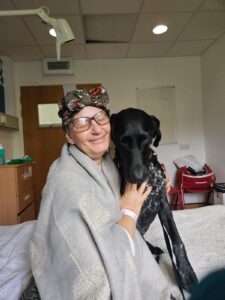
Amanda in hospital with Clyde
A couple of days later, while still waiting for the appointment, Amanda suddenly became very ill with a high temperature. She phoned the Cheltenham Hospital emergency line number the GP had given her and was told to immediately get to the hospital.
“I’d got sepsis and pneumonia and was put in an isolation ward. I was given loads of IV antibiotics, and from this time onwards I stayed in hospital for the best part of a year, although I was so ill they had to delay the start of my chemotherapy for two weeks.”
At this point, Amanda was officially diagnosed with acute myeloid leukaemia (AML) and started treatment.
“I’d be given three lots of chemo over ten days, then have a month getting over it, then be allowed home for a couple of weeks, then back for more. I was in all over Christmas and even met Santa! My wonderful Macmillan nurse Lisa arranged for me to have a few hours home on Christmas Day with the rapid response team come in to give me IV drugs.
“I lost all my hair – in fact I haven’t got it back, it’s just like a fuzz. But oddly enough that never really worried me. I thought if I can lose my hair I will save my life. But I had vomiting, diarrhoea, weight loss, it was awful. In my job as an NHS Rehab Senior I work all the time to help people come out the other side of things like this. Now I was living it. So I made sure every morning I got out of bed, had a wash and got dressed, even if it took me two hours. Often I had to go and lie on the bed between the wash and getting dressed, but I pushed on. And in the end I only ever missed two days and that was when I had my stem cell transplant.”
The worst low point Amanda experienced was when she had checked in to the Bristol Royal Infirmary (BRI) to have her transplant and was told the donor in Germany who’d been lined up had pulled out at the last minute.
“That was pretty horrendous. I’d been given two months to live if I didn’t have the transplant. I’d stayed positive all the way through as I genuinely felt like I was going to get through it, but this was hard. Fortunately they then said they’d test my son and daughter, and miraculously they were both 100% match. They said they’d never heard of this before in the UK or anywhere.”
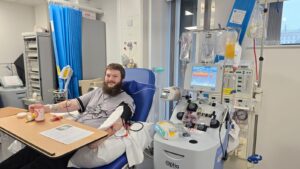
Amanda’s son and stem cell donor Joseph
Son Joseph, 34, who lives nearby, was quickly admitted to the BRI to donate his cells.
“He was my miracle. The normal donation is five million cells over two days, but he donated 10 million in one day, which meant they could send the rest for research. I’m beyond proud of him, and so grateful as he saved my life.
“I had my stem cell transplant on 2nd January 2025 and stayed in the hospital until 17th. I then moved to an isolation flat nearby. This operates as a ‘virtual ward’ where nurses come and see you and do all the tests, but it’s a bit nicer than a hospital bed. I was there for around three months before I went home.”
Since her return to her cottage in the Forest of Dean, Amanda has continued her focus on regaining mobility.
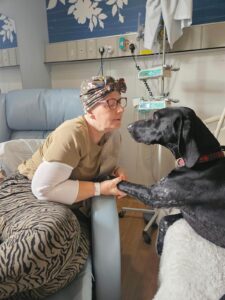
Amanda and Clyde during recovery
“My mobility has been a battle as I had a small amount of brain damage through the chemo which affected my balance. It was like I was drunk all the time to start off with. I needed a wheelchair, then used a mobility walker. Every day Dave and I have walked with our German Pointer dog Clyde in woods near our house and over time it has got better and better. Clyde has been really important in my recovery. He came to see me so many times in hospital and would sit on the Macmillan nurse’s lap. I was a vet nurse for 20 years and got him as a puppy to train as a service dog. Because of my background the breeder wanted me to be there to help his mother when he was born. He came out and wasn’t breathing so I gave him some puffs and got him going. I rescued him and now he has rescued me.
“Clyde, my family and friends, and my work colleagues gave me the support I needed. Everyone was amazing. I have a memory box with about 150 cards in it, and they sent me gifts and visited me. My support group even ran up as far as Scotland where three of my closest friends would surprise me by coming down and doing hospital visits. My daughter Sam who lives in Gloucester looked after Clyde for nearly a year while I was ill. There wasn’t one day when I ever felt afraid, alone or not cared for by both the Cheltenham and Bristol haematology and oncology teams. I’m so grateful to everyone.
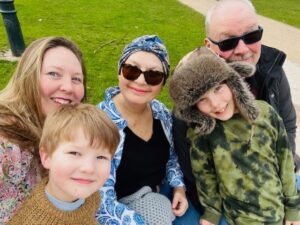
Amanda during treatment with family
“I’m currently dealing with some Graft vs Host Disease (GvHD) which is still another struggle. My skin feels like it’s been stung by stinging nettles and my eyes are dry. And I still get incredibly tired. So I want to get that under control but then I can’t wait to get back to work, hopefully in January 2026. I have always been empathetic to my patients of course, but it’s even more so now. I just didn’t realise it was so hard. But I took the advice I’d given countless people, and it’s a long slog, but I knew if I persevered I’d get there.”
Share your story
We want to help people tell and share the leukaemia stories that matter – stories like Amanda’s and stories like yours.
Related posts
28 November 2022
Leukaemia UK John Goldman Fellow awarded Professorship
Talented blood cancer researcher, Vignir Helgason, was awarded a Leukaemia UK John Goldman Fellowship in 2015, for his research into chronic myeloid leukaemia (CML). Since then, his research career has…
16 November 2021
John Goldman Fellowships for 2022 open in December
Leukaemia UK is delighted to continue its investment and funding for early career scientists and clinicians in 2022.
21 May 2020
A new clinical trial announced
A study into the impact of severe covid-19 infection on patients who receive stem cell transplants for blood cancers and blood disorders.
4 August 2020
Our life-saving work must continue
Leukaemia and other blood cancers don’t stop for coronavirus (COVID-19) and our vital research and care must continue